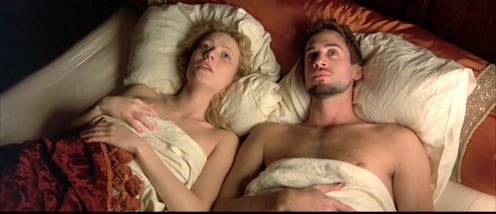Books
Shakespeare's Dirtiest Lines Ever

This month marks William Shakespeare's 400th death-day anniversary. For someone who's soon to be 452 years old (he may have died on his birthday, just to add insult to injury), you'd expect him to be a little more mature. But, like any truly great author, Shakespeare's work is riddled with dick jokes, fart jokes, and every filthy thing in between. For your reading pleasure, here are eleven of Shakespeare's dirtiest lines.
Shakespeare has quite the reputation today for being the highest of highbrow. But back in the day, Shakespeare didn't just write for earls and queens; his plays were the pop culture entertainment of his time. Theatre was considered so unsuitable that it was banned in London itself. The Globe was just outside the city, along with most of the prostitution and gambling. Audience members could pay a penny to stand and watch the plays, and they regularly threw fruit at the actors. Shakespeare's plays did have the high-minded philosophical stuff, sure, but they also had plenty of gratuitous toilet humor. Think Citizen Kane crossed with The Hangover 3.
Shakespeare was the king of dirty double entendre. Even some of his most famous quotes have been greatly cleaned up over the years (Juliet's "A rose by any other name would smell as sweet" line was a dig at one of Shakespeare's rivals, the smelly Rose Theater). So if you're in need of some Shakespearean filth, check out these lines that just scratch the surface of the Bard's bathroom humor:
1. MALVOLIO: By my life, this is my lady’s hand. These be her very C’s, her U’s and her T’s, and thus makes she her great P’s.
- Twelfth Night
Yup. If you don't get it, try pronouncing "and her T's" as "'N her T's." Yes, he's spelling the word that you think he's spelling. And you'd better believe that the "P" is, in fact, a reference to "pee." This is written by the man who gave us Hamlet.
2. Much Ado About Nothing
- Much Ado About Nothing
OK, I know that this is technically a title and not a line, but it has a triple meaning. "Much Ado About Nothing" just means "A Big Deal Over Nothing." Simple enough. But "nothing" would have been pronounced "noting," which meant "eavesdropping." So the title also means "A Big Deal Over Eavesdropping." Because there's lots of eavesdropping in the play. That's cute! But "nothing" was also slang for a lady's... lady parts. So "Much Ado About Nothing" is really called "All 'Bout Vagina."
3. HAMLET: Do you think I meant country matters?OPHELIA: I think nothing, my lord.
- Hamlet
This line comes right after Hamlet asks if he can lay his head in Ophelia's lap, and she declines. Try pronouncing "country" without the last syllable. Now apply your new knowledge of what the word "nothing" meant to Elizabethans. Yeah. Hamlet's got a way with the ladies.
4. CHIRON: Thous has undone our mother.AARON: Villain, I have done they mother.
- Titus Andronicus
To be fair, in the play Aaron is having an affair with Chiron's mom. But it's still a pretty sick "yo mama" burn.
5. IAGO: I am one, sir, that comes to tell you your daughter and the Moor are now making the beast with two backs.
- Othello
The "best with two backs" might be a common saying now, but Shakespeare deserves some credit for coining this one (also, Iago's a tool for saying this to Desdemona's father).
6. DROMIO: A man may break a word with you sire, and words are but wind. Ay, and break it in your face, so he break it not behind.
- A Comedy of Errors
Breaking wind? Get it? Get it? It's a fart joke. Moving on...
7. PYRAMUS: O kiss me through the hole of this vile wall!THISBE: I kiss the wall's hole, not your lips at all.
- A Midsummer Night's Dream
In this scene, the "rude mechanicals" are putting on a play, so the "wall" is being played by a person. And Thisbe definitely does not want to be kissing the wall's hole.
8. Graze on my lips, and if those hills be dry / Stray lower, where the pleasant fountains lie.
- Venus and Adonis
This line is not actually from a Shakespeare play, but from his poem Venus and Adonis. The whole plot of the poem is pretty much just Venus and Adonis getting it on (although Venus is significantly more interested than Adonis). In this romantic moment, she's gently "suggesting" that Adonis head downtown after they make out.
9. MERCUTIO: Oh, that she were an open arse, and thou a poperin pear.
- Romeo and Juliet
Oh, Mercutio. He always knows how to cheer up his lovelorn friend. That's why he tells Romeo to find a girl who's like a "medlar fruit," commonly known as an "open arse." And he tells Romeo to be a pop-'er-in pear. Yup. Mercutio just wants his friend to be open to new experiences (and to find a nice gal who likes it in the backdoor).
10. PETRUCHIO: Who knows not where a wasp does wear his sting? In his tail. KATHARINA: In his tongue. PETRUCHIO: Whose tongue? KATHARINA: Yours, if you talk of tails: and so farewell. PETRUCHIO: What, with my tongue in your tail?
- The Taming of the Shrew
Let it never be said that Shakespeare didn't talk about tongues in people's butts in a romantic setting.
11. LAUNCE: Well, the best is, she hath no teeth to bite.
- The Two Gentlemen of Verona
Launce doesn't mind that his girlfriend has no teeth, because that means she has no teeth to bite him during adult activities. What a lucky woman.
Images: Courtesy of Miramax Films; Giphy (12)